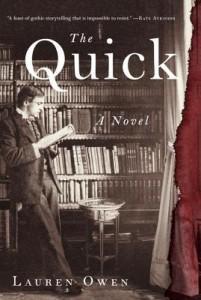Title: The Quick
Author: Lauren Owen
ISBN: 978-0-8129-9327-1
No. of Pages: 544
Genre: Literary Fiction
Origins: Random House
Release Date: 17 June 2014
Bottom Line: A gorgeous modern-day rendition of an old-fashioned horror story
 Synopsis:
Synopsis:
“1892: James Norbury, a shy would-be poet newly down from Oxford, finds lodging with a charming young aristocrat. Through this new friendship, he is introduced to the drawing-rooms of high society and finds love in an unexpected quarter. Then, suddenly, he vanishes without a trace. Alarmed, his sister, Charlotte, sets out from their crumbling country estate determined to find him. In the sinister, labyrinthine London that greets her, she uncovers a hidden, supernatural city populated by unforgettable characters: a female rope walker turned vigilante, a street urchin with a deadly secret, and the chilling “Doctor Knife.” But the answer to her brother’s disappearance ultimately lies within the doors of the exclusive, secretive Aegolius Club, whose predatory members include the most ambitious, and most bloodthirsty, men in England.”
Thoughts: The best horror stories are those with elements of truth about them. In The Quick, Lauren Owen uses the very real exclusivity and mystery of popular gentlemen’s clubs from turn-of-the-century England within which she bases her horrors. The secrecy of such clubs exudes danger and suspicion, so the two are a natural fit. In combining these two elements, Ms. Owen also manages to mock such clubs and their self-importance, their stringent adherence to rules, and how quickly their structure dissipates without those rules. It is a brilliant combination of horror and satire, and it is completely unexpected.
Ms. Owen sets up her story to follow James Norbury as he tests his wings in London after University and a life of privilege in northern England. From the moment of his introduction, it is apparent that James is a fragile character. As a child, he is highly dependent on his sister for love and friendship. As he ages, this dependency shows itself in a severe shyness and penchant for solitude that borders on isolation. He has few friends, and as he starts out in London, one cannot help but empathize with his loneliness. He is a genuinely good person, and one hopes that such people would have many friends for support and guidance. Eventually, he makes friends, and these friends provide the means by which he blossoms and grows into an admirable man. More importantly, he finds happiness and love. Then, it is all brutally ripped away from him.
The suddenness with which the story shifts and changes is extremely unsettling, and it will take readers several chapters after the shift to feel comfortable with the story’s direction. In fact, it very well may upset a reader so much that one is unwilling to continue to read it. It is that abrupt a change that it is difficult for the mind and heart to adjust to it. For those who push through their shock, the resulting story is rich in mythology and vibrant in its details. James’ story is the tip of the iceberg compared to what follows. The introduction of new characters flesh out James’ London, and his involvement in the mysterious Aegolius Club adds excitement and danger to what could have become a very pedantic story.
Ms. Owen provides the same amount of care with her other characters as she does with James. Each narrator gets the right balance of exposure, development, and even closure as they enter the stage, wreak havoc or make a difference, and then continue on with their lives in the story’s aftermath. Their narratives blend and combine in rather unexpected ways, and they just as seamlessly part. Each narrative ends appropriately without becoming unnecessarily drawn out or melodramatic. Just as she lulls a reader into a false sense of peace and happy endings, Ms. Owen provides a stark and thoroughly chilling reminder that The Quick is first and foremost a horror story, even if it did not seem that way during the first quarter of the novel.
The Quick is perfectly atmospheric for the time period and subject matter. Ms. Owen draws a reader into the story with her picturesque prose and keeps a reader’s interest with her brilliant sleight of hand and jaw-dropping twists. The story follows multiple narrators but at no point in time does it become difficult to keep their stories separate. As their stories begin to intertwine, the novel reaches a depth and scope reminiscent of Charles Dickens. The supernatural elements of the story are a complete surprise, incorporated well without being farcical. The Quick is an excellent modern-day example of an old-fashioned horror story where the setting and character development are just as important as the plot.
